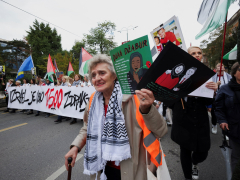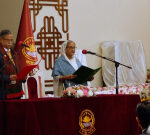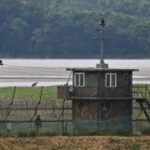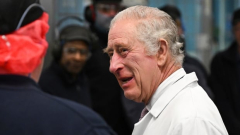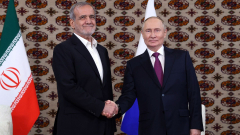This year marks three decades since the end of the war in Bosnia and Herzegovina, in which an estimated 100,000 people lost their lives. The war culminated in the Srebrenica genocide in July 1995, in which the Bosnian Serb forces, led by General Ratko Mladić, known as the “Butcher of Bosnia”, massacred more than 8,000 men and boys in a United Nations-designated “safe area”.
In the following decades, the International Criminal Tribunal for the Former Yugoslavia heard hundreds of witnesses and sentenced dozens of high-ranking Bosnian Serb political and military leaders, including those convicted of genocide. Meanwhile, the state of Bosnia and Herzegovina and foreign donors put significant funds into the study, victim recovery and remembrance of the genocide.
When the genocide in Gaza began, many Bosnians who survived the 1992-1995 war saw striking parallels between their own experiences and the suffering of Palestinians. Many took to the streets and spoke out against the genocidal war in Palestine.
However, many Bosnian intellectuals, especially those researching war crimes and genocide, have remained silent. Their refusal to speak out harms not just efforts to deliver justice for Gaza but also undermines the field of genocide studies.
Voices of conscience
Before we explore why Gaza has become such a taboo topic for Bosnian genocide scholars, it is important to point out that not all have remained silent. A relatively small group of Bosnian scholars who are not only academics but also active advocates for Palestine and human rights have chosen to speak up.
University professors and researchers, such as Lejla Kreševljaković, Sanela Čekić Bašić, Gorana Mlinarević, Jasna Fetahović, and Sanela Kapetanović have underscored that there is moral responsibility not to remain silent. They have led by example, participating in protests and speaking out in public.
Belma Buljubašić, a professor at the Faculty of Political Science at the University of Sarajevo, has criticised European and other political leaders who express sympathy for Srebrenica while justifying Israel’s actions in Gaza as acts of “self-defence”. Such double standards, she has argued, reveal a troubling pragmatism that undermines both solidarity and accountability.
In a recent interview, Edina Bećirević, a genocide scholar at the University of Sarajevo’s Faculty of Criminalistics, Criminology and Security Studies, said the genocide in Gaza clearly mirrors the dynamics seen in Srebrenica, defined by dehumanisation, ideological mobilisation and international complicity.
Ahmet Alibašić, the director of the Center for Advanced Studies and professor at the Faculty of Islamic Studies at the University of Sarajevo, has also been outspoken. Last year, he co-organised a seminar called From the Balkans to Gaza: A Critical Analysis of Genocide, which examined contemporary dynamics of mass violence through a “comparison between the Srebrenica genocide, the Sarajevo siege and the unfolding genocide in Gaza”.
Nidžara Ahmetašević, a Sarajevo-based journalist and media scholar, has also not hesitated to draw parallels between Gaza and the experiences of Bosnian survivors from besieged Sarajevo and Srebrenica.
For months, members of the Sarajevo Feminist Anti-Militarist Collective have been conducting demonstrations in downtown Sarajevo in which they read the names of children killed in Gaza, juxtaposing war crimes in the occupied Palestinian territory to Sarajevo’s own war horrors.
These individuals have all responded in various ways to the late Palestinian scholar Edward Said’s enduring exhortation that intellectuals must claim the space to speak truth to power, connect local memory to global justice and resist the politics of convenient truth-telling. Silence remains not a neutral stance but a political choice that sustains harm.
‘Not our battle’
Still, Said’s call has not stirred everyone to action. Paradoxically, many Bosnian genocide scholars have remained conspicuously silent, even as their colleagues abroad, among them Israeli genocide scholars Omer Bartov, Amos Goldberg and Shmuel Lederman, have publicly accused Israel of committing genocide in Gaza. This did not change even after the International Association of Genocide Scholars, the world’s largest aca

